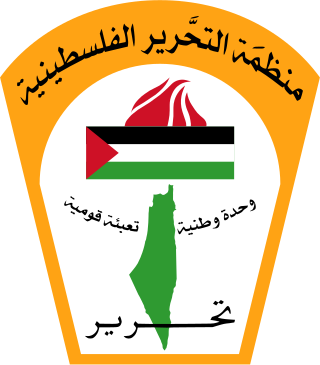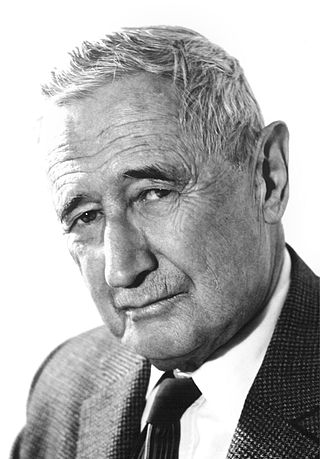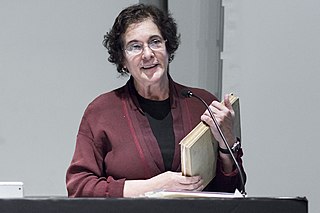
The Palestine Liberation Organization is a Palestinian nationalist coalition that is internationally recognized as the official representative of the Palestinian people in both the Palestinian territories and the diaspora. It is currently represented by the Palestinian Authority based in the West Bank city of Al-Bireh.

Zionism is an ethnocultural nationalist movement that emerged in Europe in the late 19th century and aimed for the establishment of a home for the Jewish people through the colonization of Palestine, an area roughly corresponding to the Land of Israel in Judaism, and of central importance in Jewish history. Zionists wanted to create a Jewish state in Palestine with as much land, as many Jews, and as few Palestinian Arabs as possible. Following the establishment of the State of Israel in 1948, Zionism became Israel's national or state ideology.

Nahum Goldmann was a leading Zionist. He was a founder of the World Jewish Congress and its president from 1951 to 1978, and was also president of the World Zionist Organization from 1956 to 1968.

Efraim Karsh is an Israeli and British historian who is the founding director and emeritus professor of Middle East and Mediterranean Studies at King's College London. Since 2013, he has served as professor of political studies at Bar-Ilan University. He is also a principal research fellow and former director of the Middle East Forum, a Philadelphia-based think tank. He is a vocal critic of the New Historians, a group of Israeli scholars who have questioned the traditional Israeli narrative of the Arab–Israeli conflict.

Hamid Dabashi is an Iranian-American professor of Iranian Studies and Comparative Literature at Columbia University in New York City.

Palestinian Jews or Jewish Palestinians were the Jews who inhabited Palestine prior to the Declaration of the Establishment of the State of Israel on 14 May 1948.

Rashid Ismail Khalidi is a Palestinian-American historian of the Middle East and the Edward Said Professor Emeritus of Modern Arab Studies at Columbia University. He served as editor of the Journal of Palestine Studies from 2002 until 2020, when he became co-editor with Sherene Seikaly.
Ibrahim Abu-Lughod was a Palestinian academic, characterised by Edward Said as "Palestine's foremost academic and intellectual" and by Rashid Khalidi as one of the first Arab-American scholars to have a really serious effect on the way the Middle East is portrayed in political science and in America". His student Deborah J. Gerner wrote that he "took on the challenge of interpreting U.S. politics and society for the Palestinian community as well as eloquently articulating Palestinian aspirations to the rest of the world."
As an organized nationalist movement, Zionism is generally considered to have been founded by Theodor Herzl in 1897. However, the history of Zionism began earlier and is intertwined with Jewish history and Judaism. The organizations of Hovevei Zion, held as the forerunners of modern Zionist ideals, were responsible for the creation of 20 Jewish towns in Palestine between 1870 and 1897.

Lila Abu-Lughod is an American anthropologist. She is the Joseph L. Buttenweiser Professor of Social Science in the Department of Anthropology at Columbia University in New York City. She specializes in ethnographic research in the Arab world, and her seven books cover topics including sentiment and poetry, nationalism and media, gender politics and the politics of memory.

During the British rule in Mandatory Palestine, there was civil, political and armed struggle between Palestinian Arabs and the Jewish Yishuv, beginning from the violent spillover of the Franco-Syrian War in 1920 and until the onset of the 1948 Arab–Israeli War. The conflict shifted from sectarian clashes in the 1920s and early 1930s to an armed Arab Revolt against British rule in 1936, armed Jewish Revolt primarily against the British in mid-1940s and finally open war in November 1947 between Arabs and Jews.
Muslim supporters of Israel refers to both Muslims and cultural Muslims who support the right to self-determination of the Jewish people and the likewise existence of a Jewish homeland in the Southern Levant, traditionally known as the Land of Israel and corresponding to the modern polity known as the State of Israel. Muslim supporters of the Israeli state are widely considered to be a rare phenomenon in light of the ongoing Israeli–Palestinian conflict and the larger Arab–Israeli conflict. Within the Muslim world, the legitimacy of the State of Israel has been challenged since its inception, and support for Israel's right to exist is a minority orientation. Pro-Israel Muslims have faced opposition from both moderate Muslims and Islamists.

Galit Hasan-Rokem is the Max and Margarethe Grunwald professor of folklore at the Mandel Institute of Jewish Studies at the Hebrew University of Jerusalem. Author and editor of numerous works, including co-editor of the Wiley-Blackwell Companion to Folklore (2012), her research interests include proverbs, folklore and culture of the Middle East, and folklore genres and narratives. She is also a published poet and translator of poetry, and a Pro-Palestinian activist. The Jerusalem Post has called her "a figure of some prominence in Jerusalem intellectual circles".

Smadar Lavie is a professor emerita of anthropology at the University of California Davis, and a Mizrahi anthropologist, author, and activist. She specializes in the anthropology of Egypt, Israel and Palestine, emphasizing issues of race, gender and religion. She received her doctorate in anthropology from the University of California at Berkeley (1989).
Labor Zionism or socialist Zionism is the left-wing, socialist variant of Zionism. For many years, it was the most significant tendency among Zionists and Zionist organizations, and was seen as the Zionist faction of the historic Jewish labour movements of Eastern Europe and Central Europe. Labor Zionism eventually developing local movements in most countries with sizable Jewish populations. Unlike the "political Zionist" tendency founded by Theodor Herzl and advocated by Chaim Weizmann, Labor Zionists did not believe that a Jewish state would be created by simply appealing to the international community or to powerful nations such as the United Kingdom, Germany, or the former Ottoman Empire. Rather, they believed that a Jewish state could only be created through the efforts of the Jewish working class making aliyah to the Land of Israel and raising a country through the creation of a Labor Jewish society with rural kibbutzim and moshavim, and an urban Jewish proletariat.
The New Historians are a loosely defined group of Israeli historians who have challenged traditional versions of Israeli history and played a critical role in refuting some of what critics of Israel consider Israel's foundational myths, including Israel's role in the 1948 Palestinian expulsion and flight and Arab willingness to discuss peace. The term was coined in 1988 by Benny Morris, one of the leading New Historians. According to Ethan Bronner of The New York Times, the New Historians have sought to advance the peace process in the region.

Avi Shlaim is an Israeli and British historian of Iraqi Jewish descent. He is one of Israel's "New Historians", a group of Israeli scholars who put forward critical interpretations of the history of Zionism and Israel.

Palestinian nationalism is the national movement of the Palestinian people that espouses self-determination and sovereignty over the region of Palestine. Originally formed in the early 20th century in opposition to Zionism, Palestinian nationalism later internationalized and attached itself to other ideologies; it has thus rejected the occupation of the Palestinian territories by the government of Israel since the 1967 Six-Day War. Palestinian nationalists often draw upon broader political traditions in their ideology, such as Arab socialism and ethnic nationalism in the context of Muslim religious nationalism. Related beliefs have shaped the government of Palestine and continue to do so.
Areej Sabbagh-Khoury is a Palestinian sociologist, scholar, author, and educator. She is Assistant Professor in the Department of Sociology at the University of California, Berkeley and Associate Professor in the Department of Sociology and Anthropology at the Hebrew University of Jerusalem. She is most known for her scholarship on Zionist settler colonization and the Palestinian citizen population in Israel.

Zionism has been described by several scholars as a form of settler colonialism in relation to the region of Palestine and the Israeli–Palestinian conflict. This paradigm has been applied to Zionism by various scholars and figures, including Patrick Wolfe, Edward Said, Ilan Pappe and Noam Chomsky. Zionism's founders and early leaders were aware and unapologetic about their status as colonizers. Many early leading Zionists such as Theodor Herzl, Max Nordau, and Ze'ev Jabotinsky described Zionism as colonization.













